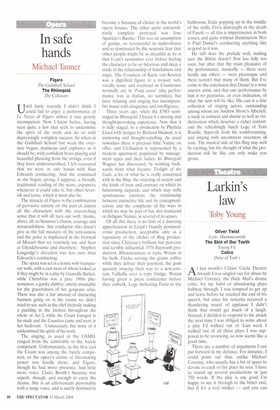In safe hands
Michael Tanner
Figaro The Guildhall School The Rhinegold The Coliseum
Until fairly recently I didn't think I could fail to enjoy a performance of Le Nozze di Figaro unless it was grossly incompetent. Now I know better, having seen quite a few that seek to undermine the spirit of the work and do so with depressingly complete success. So when at the Guildhall School last week the overture began, mutinous and explosive as it should be, with confident brass playing and beautiful phrasing from the strings, even if they were undernourished, I felt reassured that we were in safe hands with Sian Edwards conducting. And she continued as she began. giving. I suppose, a broadly traditional reading of the score, expansive whenever it could take it, but often feverish and tense, which it must also be.
The miracle of Figaro is the combination of pervasive anxiety on the part of almost all the characters with the overarching sense that it will all turn out well, thanks, above all, to Susanna's charm, courage and resourcefulness. Any conductor who doesn't give us the full measure of the seriousness and the poise is implicated in the betrayal of Mozart that we routinely see and hear at Glyndebourne and elsewhere. Stephen Langridge's direction was less sure than Edwards's conducting.
The opera was set in a house with transparent walls, with a cast most of whom looked as if they might be in a play by Granville Barker, while Cherubino was a pure 1980s phenomenon, a gawky dubber, utterly unsuitable for the gracefulness of her gorgeous arias. There was also a fair amount of distracting business going on in the rooms we didn't need to see, such as the chef tirelessly making a pudding in the kitchen throughout the whole of Act I, while the Count lounged in his study and the Countess came and went in her bedroom. Unnecessary, but none of it undermined the spirit of the work.
The singing, as usual at the GSMD, ranged from the admirable to the barely competent. Unfortunately, in the first east the Count was among the barely competent, so the opera's centre of threatening power was hardly there; and Figaro, though he had more presence, had little more voice. Claire Booth's Susanna was superb, though, and enough to carry the drama. She is an effervescent personality with a tangy voice, and is surely destined to become a Susanna of choice in the world's opera houses. The other quite extraordinarily complete portrayal was Jose Aparicio's Basilio. This was an assumption of genius, so resourceful in malevolence and so dominated by the neurotic fear that other people might be as dreadful as he is that I can't remember ever before feeling the character to be so hilarious and deep a study in the relationship of hatefulness and angst. The Countess of Katie van Kooten was a dignified figure in a trouser suit, vocally tense and overloud as Countesses normally are in 'Porgi amor' (the performance was in Italian, no surtitles), but later relaxing and singing her incomparable music with eloquence and intelligence.
Three years ago, when the ENO semistaged its Rhinegold, I found it a moving and thought-provoking experience. Now that it is fully staged, in a production by Phyllida Lloyd with designs by Richard Hudson, it is unmoving and thought-repelling. As usual nowadays there is precious little Nature on offer, and Civilisation is represented by a modern apartment populated by management types and their ladies. In Rhinegold Wagner has discovered, by working backwards from what became Twilight of the Gods, a lot of what he is really concerned with in the Ring: the ordering of society and the kinds of trust and contract on which its functioning depends. and which may stifle spontaneous emotion; the relationship between instinctive life and its conceptualisation: and the complexity of the ways in which we may be part of but also transcend or disfigure Nature, in several of its senses.
Of all this there is no hint of a dawning apprehension in Lloyd's blandly postmodernist production, acceptable only as a repository of the clichés of Ring production since Chereau's brilliant but perverse and terribly influential 1976 Bayreuth production. Rhinernaidens as tarts, Wotan in his bath, Fricka serving the giants coffee while they debate their payment, the gods queasily swaying their way to a non-existent Valhalla over a rope bridge, Wotan having given a press conference before they embark, Loge molesting Freia in the
bathroom, Erda popping up in the middle of the stalls, Freia distraught at the death of Fasolt — all this is impertinence in both senses, and quite without illumination. Nor is Paul Daniel's conducting anything like as good as it was.
He still does the prelude well, making sure the Rhine doesn't flow too fully too soon, but after that the main pleasures of the performance, musically — there were hardly any others — were picaresque and there weren't that many of them. But I've come to the conclusion that Daniel is a most uneven artist, and that one performance by him is no guarantee, or even indication, of what the next will be like. His cast is a fine collection of singing actors, outstanding among whom are Andrew Shore's Alberich, a study in torment and shame as well as vindictiveness which deserves a richer context; and the refreshingly butch Loge of Tom Randle, hyper-fit from his world-roaming, and singing with uncommon sweetness ot tone. The musical side of this Ring may well be exciting, but the thought of what the production will be like can only make you groan.


































































 Previous page
Previous page